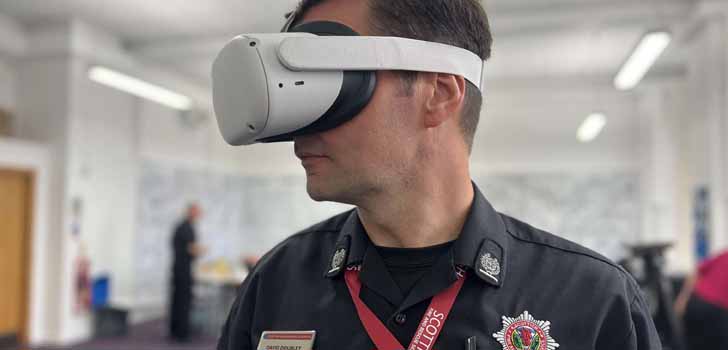Aside from gaming, virtual reality inherently has virtually unlimited potential applications, which now include forensic investigations.
Researchers in University of Dundee’s (UD) Leverhulme Research Centre for Forensic Science (LRCFS) and Duncan of Jordanstone College of Art and Design (DJCAD) have developed a cutting-edge tool for fire investigators using VR technology.
Working in collaboration with Danish Police, fire investigators have created a fire scene in VR using digital images from real fire-damaged locations.
Modern Tech is Perfect for Fire Investigation
According to UD, police and fire service investigators currently use controlled burns in shipping containers or abandoned properties to simulate fire scenes.
After the burn, investigators scour the scene for clues and attempt to determine how and where the fire started.
UD says controlled burns are efficient but costly, unsustainable, and environmentally unfriendly.
With digital images and VR technology, there is no limit to how many times a researchers and investigators can use a scene.
Investigators can also explore and examine realistic settings without worrying about potential environmental hazards.
“We have been looking at how VR can facilitate fire scene investigation and the investigation of crime scenes for some time now,” says LRCFS Director Professor Niamh Nic Daeid. “What is most important is that we ensure that we use virtual reality in a way that is underpinned by a robust scientific approach which will stand up to the scrutiny of our legal systems and our courts, and we are pioneering this approach now in Scotland.”
UD says the Leverhulme team is collaborating with fire investigators to research operational VR opportunities in fire investigation in Scotland.
Participating agencies include the Scottish Police Authority, Forensic Services, and Scottish Fire and Rescue services.
Investigators recently visited UD to test the VR system for the first time.
Danish Police fire investigators worked with researchers to capture and develop realistic VR scenes using staged and burned abandoned buildings.
The team captured hundreds of images to document the site, capturing the fire’s aftermath.
The resulting VR environment is already part of fire investigation training in Denmark.
“The feedback from the sessions has been fantastic,” says Danish Police Special Crime Unit’s Eva Ljungkvist. “Investigators have been using the tool effectively while applying scientific methods to construct their investigation. This is exactly what we want to see.”
Karen Robertson at SPA Forensic Services says VR has provided a fantastic collaborative opportunity for Forensic Services fire investigators and Fire Service colleagues.
“The Fire Investigators have been using VR to investigate the same fire scene which has known origin and cause,” says Robertson. “The data from this will be used to improve the crime scene-to-court provision of forensic fire investigation for the people of Scotland.”
Image: University of Dundee

